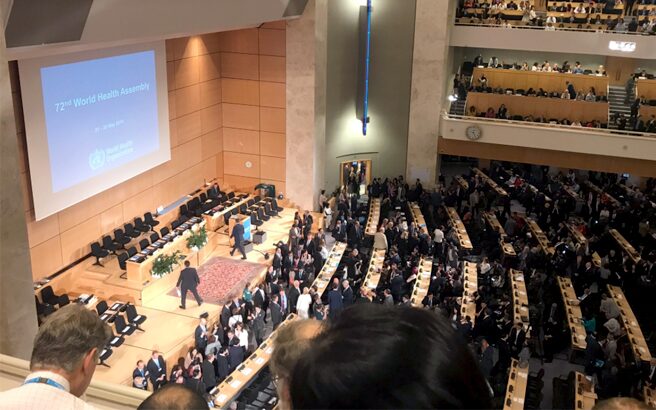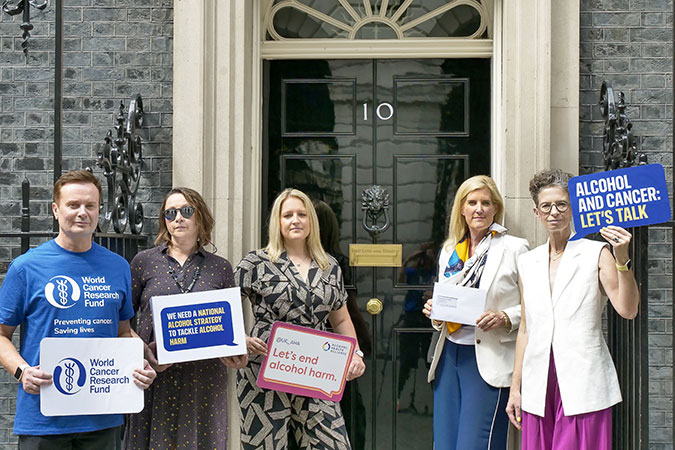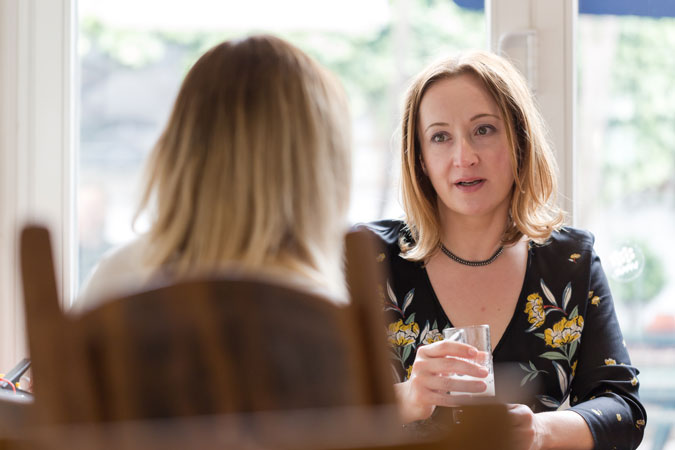Our Policy and Public Affairs Officer, Margarita Kokkorou, attended the 72nd World Health Assembly – her first experience of this key event in the health policy calendar.
The World Health Assembly (WHA) is the decision-making body of the World Health Organization (WHO). It brings together delegations from all WHO Member States and focuses on a specific health agenda prepared by the Executive Board. The main functions of the WHA are to determine the policies of the WHO, appoint the Director-General, supervise financial policies, and review and approve the proposed programme budget.
This year the agenda focused on universal health coverage (UHC), and unfortunately only a small focus was on non-communicable diseases (NCDs). However, myself and the rest of the Policy and Public Affairs (PPA) team were prepared to promote the importance of NCD prevention in the UHC agenda.
An exciting opportunity
Having been at World Cancer Research Fund (WCRF) for only two months, I was excited to be given the opportunity to attend the largest annual gathering of health advocates and policymakers from around the world. Everyone was talking about how chaotic the WHA could be (including finding your way around the United Nations offices) and that the agenda could change so fast that you couldn’t really predict what was coming.
On my first day, before the official proceedings started, some side events took place. Organised by civil society organisations, these were a great warm-up to what was to come in the following days, as well as a great chance to meet people, socialise, and disseminate and promote WCRF’s work.
WCRF was involved in three side events: on Childhood obesity and the global syndemic, Putting prevention at the centre of UHC, and Tracking Health for All from rhetoric to reality. We also signed four joint statements on issues such as malnutrition in all its forms, and preventing NCDS. I was surprised to find out how complicated and stressful submitting a statement could be; there is a limited word count due to the little time you are given to read the statement out, in addition to the long hours spent waiting, which in our case was two days, until you are actually given the chance to read it to the Assembly. On this occasion, we had to resubmit our joint statement through another organisation as our team had left the WHA by the time our statement was due to be read out. The moving agenda makes it hard to know which is the best flight to take home!
On top of that, what I found quite challenging was to follow conversations that were all based on acronyms (it feels like you are in the wrong room). However, after a week at the WHA I was not only familiar with the UHC on NCDs but also with all the acronyms health advocates are using to make their lives (not mine) easier.
WCRF’s objectives
One of our main objectives in attending this big event was to disseminate our work on cancer prevention including our two Building Momentum reports: on sugar sweetened beverage taxes and front-of-pack labels. Our reports aim to help policymakers overcome common barriers when implementing evidence-informed nutrition policies and to highlight the link between diet, nutrition, physical activity and cancer.
I was pleased to find that many policymakers and people from different non-government organisations were very interested in our work and found our reports helpful for their projects, and therefore wanted to collaborate with us.
We were very proud to promote our organisation and our cancer prevention work to key stakeholders which raised WCRF’s reputation and opened doors for us for future collaborations. We left Geneva taking with us many ideas for new policy research and sources of information which will be helpful in the coming months on projects we are working on; such as CO-CREATE, our EU-funded project which focuses on physical activity, as well as our upcoming Building Momentum report on marketing restrictions of unhealthy foods to children.
> Read the four joint statements
> Find out more about our policy and public affairs work



